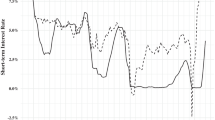Abstract
Inherent ignorance of and uncertainties about the future may translate into doubts about the overall viability of market mechanisms. However, these doubts are quelled by a broad empirical observation: market economies thrive. Hayek sometimes abstracted from such ignorance and uncertainties in order to identify the market mechanisms that are essential to thriving economies. His often-overlooked “interest-rate brake,” for instance, keeps the rate of implementation of new technologies in line with peoples willingness to save. A careful reading of macroeconomic history suggests that artificial booms often ride piggyback on genuine booms. During a period of technological breakthroughs, the central bank's adherence to the Real Bills Doctrine overrides the interest-rate brake and engenders an unsustainable boom.
Similar content being viewed by others
References
Bresciani-Turroni, C. (1934) Review of Monetary Theory and the Trade Cycle, Economica, new series, vol. 1 (August), pp. 344–47.
Garrison, R. W. (2001) Time and Money: The Macroeconomics of Capital Structure. London: Routledge.
Garrison, R. W. (1982) “Austrian Economics as the Middle Ground: Comment on Loasby,” in Israel M. Kirzner, ed., Method, Process, and Austrian Economics: Essays in Honor of Ludwig von Mises, Lexington MA: D. C. Heath and Co., 1982, pp. 131–38.
Hayek, F. A. (1929 [1975]) The “Paradox of Saving,” Profits, Interest, and Investment, Clifton, N.J.: Augustus M. Kelley, pp. 199–263.
Hayek, F. A. (1933 [1975]) Monetary Theory and the Trade Cycle, New York: Augustus M. Kelley.
Hayek, F. A. (1935 [1967]) Prices and Production, 2nd ed. Clifton, N.J.: Augustus M. Kelley.
Hayek, F. A. (1941) The Pure Theory of Capital, Chicago: University of Chicago Press.
Hayek, F. A. (1945) “The Use of Knowledge in Society,” in American Economic Review, vol. 35, no. 4, pp. 519–530.
Hayek, F. A. (1967), “The Results of Human Action But not of Human Design,” in Hayek, Studies in Philosophy, Politics and Economics. Chicago, University of Chicago Press.
Fetter, F. A. (1914) “Interest Theories, Old and New,” American Economic Review, no. 4 (March); reprinted in Fetter (1977), Capital, Interest, and Rent. Kansas City: Sheed Andrews and McMeel.
Foster, W. T. and W. Catchings Profits. New York: Houghton Mifflen, 1925.
Hill, G. (2004) “From Hayek to Keynes: G. L. S. Shackle and Ignorance of the Future,” Critical Review, vol. 16, no. 1, 2004, pp. 53–79.
Lewin, P. (1997) Rothbard and Mises on Interest: An Exercise in Theoretical Purity,” Journal of the History of Economic Thought, vol. 19 (Spring), pp. 141–159.
Keynes, J. M. (1936) The General Theory of Employment, Interest, and Money. New York: Harcourt, Brace, and Company.
Lachmann, L. M. (1976) “From Mises to Shackle: An Essay on Austrian Economics and the Kaleidic Society,” Journal of Economic Literature, vol. 14, no. 2 (March), pp. 54–62.
Mandeville, B. (1714 [1924]) The Fable of the Bees: or, Private Vices, Publik Benefits. Oxford: Clarendon Press.
Meltzer, A.H. (2003) A History of the Federal Reserve, vol. 1 (1913–1951) Chicago: University of Chicago Press, 2003.
Rabin, A. (2004) Monetary Theory, Cheltenham, UK: Edward Elgar.
Rolnick, A.J. (2004) “Interview with Ben S. Bernanke,” The Region, Minneapolis: Federal Reserve Bank of Mineapolis, pp. 19–27.
Yeager, L.B. and A.A. Rabin (1997) “Monetary Aspects of Walras's Law and the Stock-Flow Problem,” Atlantic Economic Journal, vol. 25, no. 1 (March), pp. 18–36.
Author information
Authors and Affiliations
Corresponding author
Additional information
JEL Code B22, E30, E50
Rights and permissions
About this article
Cite this article
Garrison, R.W. From Keynes to Hayek: The marvel of thriving macroeconomies. Rev Austrian Econ 19, 5–15 (2006). https://doi.org/10.1007/s11138-006-6091-y
Issue Date:
DOI: https://doi.org/10.1007/s11138-006-6091-y




